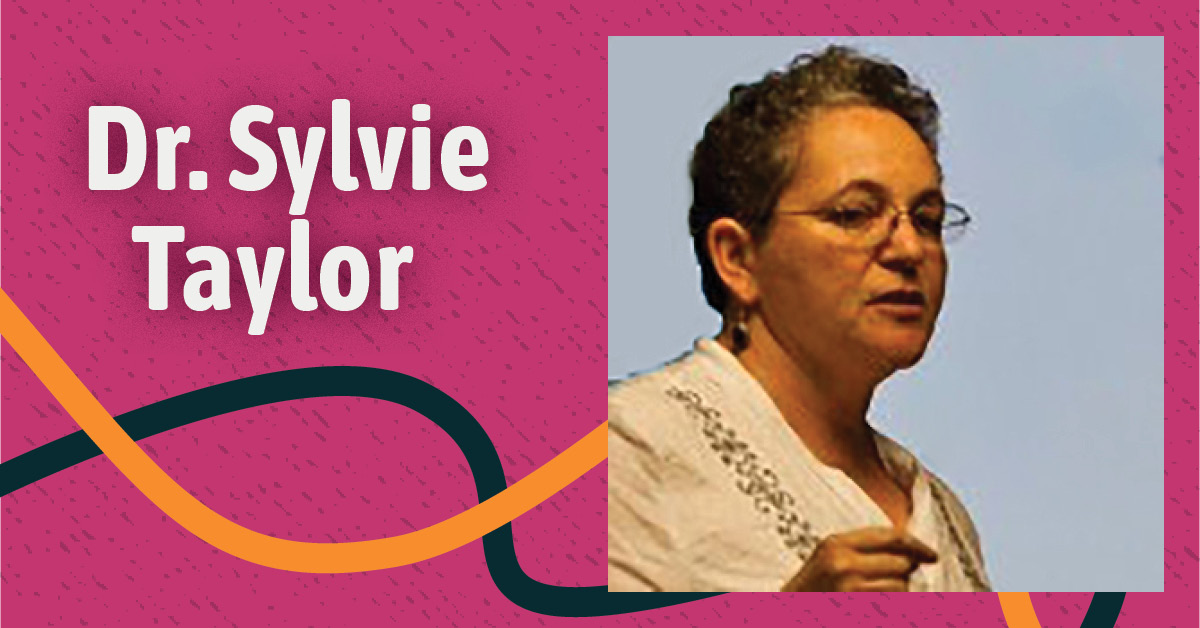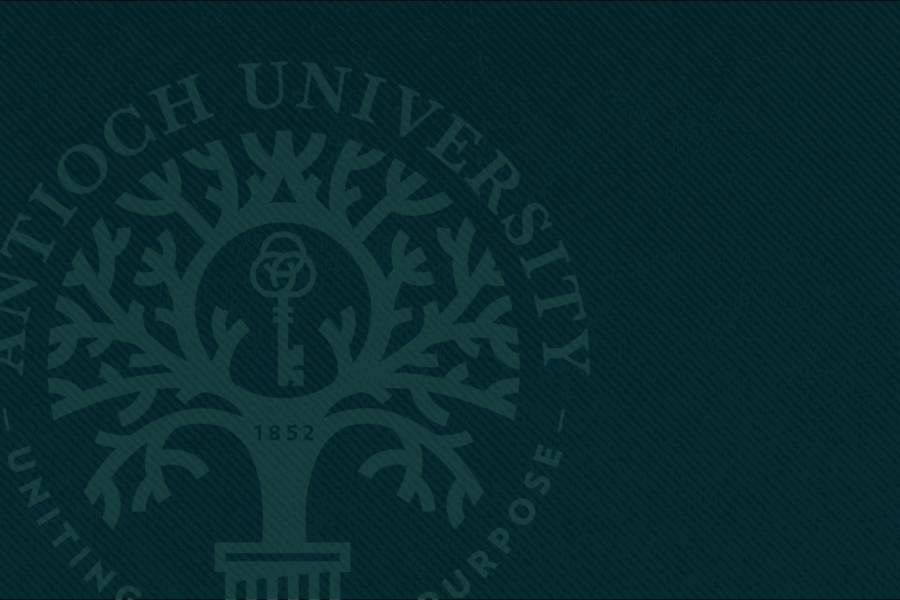The Elizabeth Hurlock Beckman Award Advisory Committee has decided to award a 2020 Beckman Award to Dr. Sylvie Taylor, Professor of Psychology at Antioch University Los Angeles. The national award is highly prestigious, and those recognized with the award and its $25,000 purse have included some of the most influential psychologists in the U.S., including Carol Dweck, Claude Steele, Alan Kazdin, Janet Helms, Nancy Boyd-Franklin, Michelle Fine, Stanley Sue, and Philip Zimbardo. The Beckman Award is intended to honor professors who have inspired students to make a difference in their communities. Says Mark Hower, the Provost and CEO of AULA, “This award is a tribute to Sylvie, of course, and given its focus it’s as if the award were made with her work specifically in mind.”
Indeed, Dr. Taylor has made a career of inspiring and training students to do vital work in their communities, both as therapists and in less traditional career paths, such as by starting non-profits. AULA alum Beth Ryan, who nominated Dr. Taylor for the award, is just such a former student: the support and mentorship of Dr. Taylor empowered her to found Stepping Forward LA, the organization she now leads. SFLA works to meet the needs of youth who age out of the foster care system. In just three years, it has served over 800 current and former foster youth out of its campus in South Los Angeles.
In her nominating letter, Ryan credits Dr. Taylor for sharing with her students the knowledge gained through a career working with gang-involved youth, pregnant and parenting teens, substance-abusing youth; working alongside first responders to disasters; and working with non-governmental international organizations in the aftermath of disaster, civil unrest, and war.
“She applies this incredible expertise to the classroom,” says Ryan, “helping her students design and devise innovative solutions to community challenges from a strengths-based perspective.”
Promoting Community Psychology
Dr. Taylor is the founder and director of the Applied Community Psychology specialization within AULA’s Master of Arts in Clinical Psychology (MAP) program. Community psychology is an area of psychology where practitioners try to go beyond an individual focus and integrate social, cultural, economic, political, environmental, and international influences. According to its largest professional organization, the Society for Community Research and Action, the goal of community psychology is to promote positive change, health, and empowerment at individual and systemic levels. “Community psychology,” explains Dr. Taylor, “is about collective wellbeing. And the way that we enhance collective wellbeing is by sharing our gifts and talents with one another.”
For that reason, the specialization focuses on how student learning can be meaningful not only to the student personally but to the work that they’re going to do in the world. Dr. Taylor explains that instructors in the specialization work both to develop student knowledge and personal development and to equip students with the “tools and strategies to go out and utilize that to make whatever context better.”
The majority of students in the specialization go on to become Marriage and Family Therapists, and Dr. Taylor estimates that about 70% of students are in some way or another involved in providing mental health services. Many carry out the mission of Community Psychology by “providing mental health services in places most mental health service professionals don’t tread: community-based organization serving low income, marginalized populations, homeless folks, veterans, etc.”
Other students end up pursuing leadership positions—working in government agencies, leading established nonprofits, or even establishing their own. It was this last possibility that drew Beth Ryan into Community Psychology in the first place.
Inspiring Help For Former Foster Youth
Ryan had known for years that she wanted to start an organization to help foster youth, but it was when she met Dr. Taylor that she realized that studying in Antioch’s MAP program would be the right place to develop that dream. From this first meeting with Dr. Taylor, she explains, “I immediately resonated with her philosophy that classroom instruction should enable students to create something of tangible value in the world.”

Dr. Taylor took a personal interest in Ryan’s work and became not just her professor but also her advisor. “She was a fierce advocate for my vision,” says Ryan, “and the collaborative and engaging environment she created in her classroom encouraged exactly the kind of analysis, creativity, and innovation needed to develop solutions for positive community change.”
In Dr. Taylor’s classroom and under her advisement, Ryan developed the philosophy and structure to make Stepping Forward LA a reality. Ryan graduated in 2017, and that same year SFLA opened its doors to youth aging out of foster care. Working out of “the Big House,” a three-story craftsman in South Los Angeles, the organization has achieved a lot over its first three-plus years. Most importantly, it has had a transformative effect on the youth it serves. Explains Ryan, “Coming from traumatic childhoods and facing incredible odds, youth aging out of foster care deserve an environment in which they can experience hope, not be retraumatized. Influenced by Dr. Taylor’s teachings, I designed SFLA to provide this positive environment.”
The statistics showing SFLA’s impact are impressive: 90% of youth served by SFLA graduate or are on track to graduate high school (compared to just 50% of foster youth nationally), 82% feel more confident in meeting and speaking to new people, and 78% learned new coping skills to deal with emotional and social challenges in healthy ways.
SFLA is embodying the mission of community psychology writ large: promoting positive change, health, and empowerment at both individual and systemic levels.
Paying Forward a Generous Award
Dr. Taylor won the Elizabeth Hurlock Beckman Award precisely because of the successes of SFLA. The award is meant for teachers who have inspired their former students to “create an organization which has demonstrably conferred a benefit on the community at large.” Beth Ryan, in nominating her, was generous in sharing the credit for developing this important and transformative organization.
The award itself comes with a $25,000 purse, which is quite a bit of money all at once, especially for a teacher. But Dr. Taylor doesn’t plan to use it herself. Instead, after taxes she is going to donate all of the money.

Half the prize she is sending forward to SFLA as a generous and unrestricted donation. Says Dr. Taylor, “It’s really wonderful to be able to donate to Stepping Forward LA in a sizable way that will be meaningful.” Ryan is deeply moved by this donation, which she did not expect. She feels that Dr. Taylor has already given so much support to SFLA: “To know that Dr. Taylor saw the same vision that I did meant so much, and to know that she continues to offer her support means the world to me.” She adds, “It’s one thing to offer encouragement and guidance, but to contribute such a substantial financial contribution to Stepping Forward LA—when she did not have to—makes me so proud and also incredibly humbled.”
The other half of the prize money Dr. Taylor is donating to the Applied Community Psychology specialization. As she explains, “It’s also important to be able to donate to the specialization that I founded to be able to sustain the work that we do.” This money will help fund exciting and vital initiatives in the specialization like a new Career Pathways program, its prize-winning Community Partnership Speakers Bureau, and various grants that help students pay for membership in professional organization, help students pay for outside training opportunities, give travel grants for students to travel to conferences, and help students with publication. It will also help the specialization weather the fundraising challenges caused by the pandemic. As Dr. Taylor explains, “This will provide a nice buffer and cushion for us to continue to support students in doing important work in the community.”
All of this captures exactly why the award seems perfectly fit to Dr. Taylor. Where someone else might take the money and rest on their laurels, Dr. Taylor feels resolved to continue doing the work. “There’s something really humbling about being nominated by your students, and it’s also a huge responsibility,” she says. “I have to now make sure that my work reflects the honor that I was awarded.”




